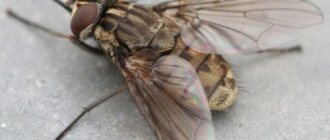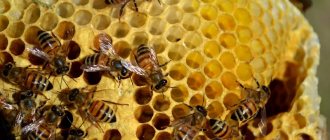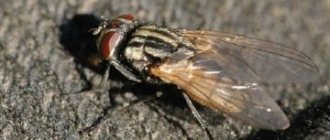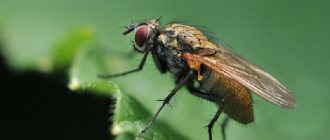How great it is when the sun is shining outside the window, everything around is blooming and green, and the thermometer rises higher and higher every day. But with warmth comes not only pleasant moments, but also something very annoying and unnerving for almost any person - insects. They fly into houses and cars and land on the body. Mosquitoes, midges, bees, beetles - there are a lot of representatives of the buzzing and so annoying brethren, but among them there are also especially nasty ones. And here, at least once, everyone has asked the question of why flies land on people. Well, it's worth figuring it out!
What kind of animal is this?
Before looking for the answer to the question of why flies land on humans, it is necessary to understand what kind of creatures they are. They belong to representatives of the order Diptera, which also includes mosquitoes. Speaking of flies, many people imagine almost the same insect, which constantly buzzes in the room or hovering in a swarm over the trash heap.
In fact, representatives of this species are very diverse, live in different parts of the world, and can be both very dangerous to humans and completely harmless. The diet of an ordinary housefly is quite wide: fat, sweat, blood and other secretions of living creatures, nectars and plant juices, the remains of other insects or human food. They eat with the help of an unusually shaped tongue - in the form of a proboscis, through which the fly sucks in its prey.
Why do flies bother you first thing in the morning?
According to experts, annoying insects land on people early in the morning due to the fact that during sleep the latter are least mobile. As long as a person remains motionless, the flies will not stop “doing their job.” These creatures do not have a sense of tact; as a result, they annoy you to the last. Flies do not have a good memory: despite the sometimes wild desire of a person to swat a fly, after a short period of time this buzzing and pestering creature again and again tries to sit on the human body and begin to absorb food.
And the last factor, the reason why an insect tries to land on a person, is the heat generated from the body. The fly is a cold-blooded insect and on a cool day, I feel the warmth emanating from a person, it flies around annoyingly and constantly strives to sit on it, in an attempt to warm itself up somewhat, and most importantly, to warm its six legs on which the taste buds are located.
Conclusion: the level of a person, that is, the degree of his spirituality, energy, wisdom, in other words, the degree of being in the world, is many times higher than the level of perception of a fly. Man, as the main component of the world, has no significance for a fly—man does not exist in its universe.
Because of these facts, if you do not want insects to disturb you and wake you up in the morning and annoy you throughout the day, you need to take insect protection measures. Install mosquito nets on windows and curtains on doorways, buy special adhesive tape or a fumigator.
If you've seen a fly rubbing its legs, you've probably wondered why it does this. You probably think that when a fly rubs its legs, it is cleaning them.
And you are absolutely right!
Why is she doing this? Is a fly, a carrier of many infections and bacteria, really a cleaner?
The end of a fly's foot (275x magnification). Between the two large “hooks” there is a pad with small bristles that secrete a sticky liquid. Photo: Trevor A. Minning, Source: filebox.vt.edu
Not certainly in that way. The fly does indeed clean dirt from its legs, but not for reasons of hygiene.
The fact is that the fly's foot ends in two pads - pulvilli. Pulvillia are covered with thin setae. These bristles secrete a sticky liquid consisting of a mixture of carbohydrates and fats. The sticky secretion (liquid) of the bristles holds the fly on a smooth surface by capillary attraction.
By studying the tracks of flies walking on clean surfaces, scientists discovered that they are identical in shape to the pads on the ends of their legs. Chemical analysis of the traces showed that they consisted of fats. Although grease itself is slippery, it helps hairs stick to smooth surfaces such as glass. The reason is the high surface tension of the fat. If the legs of a fly are degreased by dipping them in hexane for a short time, the fly will temporarily lose the ability to move on the glass surface and begin to slide.
Of course, when a fly crawls over various surfaces, dirt collects on the sticky pads and bristles of its legs. To prevent the adhesion of the legs to the surface when crawling from deteriorating due to this, the fly regularly “toilets” all six legs, cleaning them from adhering particles of debris.
By the way…
In addition, the fly has short bristles on the pulvillas - organs of touch and taste. That is, the fly senses taste first of all... with its legs, and only then with its proboscis and sucking blades! Moreover, a fly analyzes food with its feet 100-200 times better than a human with its tongue.
Have you ever wondered why a fly keeps landing on a person? If you drive her away, she sits down, if you threaten her, she doesn’t pay attention. In the end, the fly drives us out of patience, we get angry and curse it: don’t you, vile fly, understand that we don’t need it?!
But the fly still lands on the person.
Why is she doing this? There are, in general, two answers to this question. The first is obvious, or visible.
, directly catches the eye. A person is a kind of attractant for a fly, or at least contains attractants, for example, sebum and various secretions (here: an attractant is a natural substance with a specific odor that attracts insects). But, if you think about it, this answer is superficial; Formally, it explains why a fly strives to land on the surface of a person’s skin (or animal skin), but what remains inexplicable is the fly’s manic persistence, which forces it to repeat its attempts again and again, despite the obvious threat to its—the fly’s—life when a person , or the animal will finally lose its temper.
Valid
the answer is more veiled, and it does not lie on the surface. The fact is that the fly does not consider a person (animal) to be a living being, in any case, it does not consider us as some kind of animate object. The fly reacts to movement. She is attracted by a delicious smell, body warmth, the ability to collect moisture, particles of fat, healthy salts, etc. on the surface of the body. If the body does not move, the fly will “do its thing.” At the slightest movement it will fly away, only to return immediately as the movement calms down. The fact that she might disturb someone will never occur to her. So, it does not interfere with the table, on the surface of which something tasty for a fly is spilled; The table doesn't move. The man twitches. The difference between it and the table is only in the amount of movement: one object is more moving than the other object. And no more.
The amount of motion itself does not say anything about the animation of an object. So, the water moves all the time, waves, swells, ripples appear on its surface, a mountain stream runs past us; sand and pebbles crumble under our feet as we walk; the stone may roll down the slope; green leaves, grass, branches sway in the wind; the snow, swirling in the air, makes intricate patterns, etc. and so on. All this is an example of listing objects that are in a state of movement, but are not classified as animate (if plants are also considered inanimate).
So are you and me. We are moving, but this is not a sufficient reason for a fly to leave us alone. Even a table can shake and “bounce” if it is touched accidentally or intentionally - the fly will fly up, only to return a moment later and sit down. Whether a person or a table, everything is the same for a fly.
Hence the conclusion follows: the level of a person (meaning the degree of his animation, intelligence, activity, in other words, the degree of presence in the world) exceeds the level of understanding of a fly. Man as an integral part of the World does not matter to a fly - there are no people in its universe. A fly will never land on another insect, say, on an ant - a creature of comparable level to it. The fly is still able to appreciate the drama of the situation when her friend is struggling in the clutches of a spider - the eternal villain and rival, but she absolutely does not understand the reasons for “leaving for another world” if they are associated with the activities of a brutal person with a fly swatter - probably the death of her friends in the latter case is perceived as something fatal, inevitable, a kind of “evil fate”. So on our floor of the universe, people, sometimes strangely and absurdly, die from a lightning strike or a falling meteorite.
Let us derive the “law of the fly”: a fly is not able to adequately assess a level that exceeds its own; strictly speaking, she does not know any other levels other than the level of the insects and arachnids immediately surrounding her. At best she can see (feel) the bottom
in relation to it, the level is if, for example, she steps on an aphid, but
she will never be able to see (feel) the upper one
Naturally, the fly is no exception in this matter. Almost all insects in the presence of a person do not react at all to him as a person or an animate object. You might think that a person simply does not exist for them. The moth will fly around the room, oblivious to our interest. The ant will crawl about its business right under our feet, every second putting its life in mortal danger. The ladybug lands on our clothes without any trepidation, not imagining the degree of threat to which it is exposed at this moment.
This leads to a particular conclusion from the “law of the fly”: if we are dealing with a level of a lower order than our own, as in the example of the mosquito, then in most cases we will be mistaken in attributing to the lower system our own motivations and ours - and not her! - mode of action and style of problem solving. But if you have a heart-to-heart talk with us, explaining the typical misconceptions common to non-specialists, we can perhaps agree that it is stupid to judge a mosquito by itself, and even more stupid to transfer purely human things to it.
In other words, we are susceptible to persuasion regarding lower levels - we are able, if we wish, to look closer and see that the level in question is still lower than our own, with all the ensuing consequences. However, any beliefs are useless at levels higher than ours. In this case, under any circumstances, we will judge by ourselves
without realizing it.
Sic : lower - perhaps, upper - never.
Analysis of the figure allows us to introduce the following concept: a ban on what is located above or, in other words, a ban on what is superior. The “law of the fly” prohibits living, feeling, thinking, acting, and perceiving the world in a way that is characteristic of a higher order level. Let us illustrate this statement: humanity, in principle, is not able to imagine its future (the future of highly organized human civilizations), at least from a qualitative perspective
, rather than quantitative, chronological positions. It is easier to imagine the past (the low organization of human groups), although here we still strive, first of all, to judge the departed by ourselves, that is, we attribute to primitive tribes or medieval people our own motivation for actions and deeds, with which, by the way, we do not always agree historians.
It is clear that when speaking about the future and the past, the author means primarily the levels of organization of the human society system
, and not at all this or that calendar sheet.
The “law of the fly” is independent of time and space. That is, with equal success we can talk about the past and the future, implying different levels of development of systems, or different systems coexisting with each other in the same time period, provided that the levels of these systems are different. From this point of view, it does not really matter whether we are talking about the inhabitants of Europe in the 8th century. BC. or today's indigenous (underdeveloped) peoples of the Amazon jungle, Borneo, etc. - they may have a similar level of organization, which is certainly lower than the level of organization of modern, most advanced countries.
Strictly speaking, the fly of the past and the fly of the present are not much different from each other. A man is taller than a fly. But this height is also different - it itself can correspond to different levels on the tone scale, that is, the scale by which the levels of organization of the system are measured.
But let's return to the “law of the fly”. It is clear that this law is universal and can be applied to both insects and humans - to any animate systems. However, it is quite difficult to accept this law, despite its apparent simplicity; we tend to agree with it if it touches on something that is below us, and subconsciously reject it if we encounter something high, essentially inaccessible to our mind and imagination. Our entire being, our entire organization protests against the “law of the fly” as applied to the higher order level. We would rather agree that no level above us exists than to agree that this level lives and acts in a completely different way, and not as we imagine it when we try it on ourselves.
It's very easy to criticize a fly. It is much more difficult to look critically in the mirror. The fly does not consider a person to be a living being; Let's say we took note of this. But here’s another example: a person lives on the surface of the Earth, not suspecting that the Earth... is a living being, a huge living system, animated in its own way. How do you like this formulation of the question? Perhaps individual representatives of the human race, whose level of animation (spirituality) exceeds the average or generally accepted one, could agree with this idea; however, it is more likely that almost all scientists, politicians and in general “smart, respectable people” who know everything and everyone, except for the “law of the fly,” would oppose such an idea.
It is possible that the Universe itself is alive. A huge clot of consciousness, embodied in a very exotic form. Unfortunately, we can only hypothetically assume this, without having any way of knowing for sure. Otherwise, it will turn out like in that children's joke when two fleas, buried in a dog's fur, dreamily talk to each other: what do you think, is there life on the other dog?..
Alas, alas, ignorance (or rejection) of the “law of the fly” sometimes leads to very strange, even funny results. For example, today huge amounts of money are being allocated by humanity to research everything related to alien civilizations - from UFOs (which is not advertised) to searching for and deciphering radio signals from space (which is included in the estimates of all observatories). They make films and write books about aliens. And none of their creators thought about the question: why on earth did we decide that aliens would arrive on Earth on spaceships - or devices adequate to their content? Or will they establish contact with us in any other way familiar to us, for example, through a radio signal? In general, in this case we judge by ourselves - since we have learned to build rockets and control radio waves, it means that the other side
will do the same. That is, we are looking for brothers in mind.
But there can be fathers in mind, and grandfathers, and great-grandfathers...
If an extraterrestrial civilization has reached the same level of development as us, then, of course, it will not yet be able to cross the Universe, and all sorts of interplanetary aircraft and signal exchange are nothing more than childishness, which has absolutely no consequences. But if a certain civilization has learned to fight time and space, including space, then where is the guarantee that it does this using the means that are accessible to our imagination today? And in general, does she need to come into contact with us - with these “runts” who are on the development scale at the level of the cosmic Middle Ages?
Real, real aliens, or more precisely, alien intelligence with all its achievements, are absolutely incomprehensible to humans, because they are subject to a ban, according to the “law of the fly.”
In the same way, the actions of this mind in relation to us are unimaginable and unpredictable. You can try to predict only one thing - that the supposed aliens will not
to act as we believe they should act, based on our earthly, human experience (rather modest by cosmic standards). For example, they will not conquer us, since wars of conquest, well known to a person at a certain level of development, are the “calling card” of a very specific zone of the tone scale - even earthly developed countries have already overcome this zone, what can we say about universal supercivilizations!
Another thing is that a person frightened by something incomprehensible during real contact may attribute
the aliens have their own motivation, confident that they were
captured
. Alas, the “law of the fly” is inexorable and forces wishful thinking...
But it seems that we have become carried away by science fiction. Let's look at this law using more prosaic examples that are understandable to everyone, and for this let's move back to the glorious 19th century. In post-Napoleonic times, in Germany, in the small town of Heilbronn, there lived Julius Robert Mayer (1814-1878). A simple young man, not a nobleman, who dreamed of becoming a doctor, turned out to be extremely attentive and quick-witted, having an extremely tenacious analytical mind. Since childhood, he was interested in various sciences and dreamed of traveling around the world. In 1841, having found a job as a doctor on a merchant ship, he went to the distant Dutch Indies (Indonesia), to the island of Java. What happened on the ship, in general, is now known to all historians of science. The navigator’s innocent remark that the water in the sea heats up during a strong storm, and Mayer’s accidental discovery that the blood of local sailors is different in color from the blood of Europeans (oxidation processes in the body occur more slowly in hot climates), led our hero to the conclusion that the existence of a certain quantitative relationship between heat and work performed - in the physical sense of the word. And then, upon returning home, Mayer, as an amateur, writes several articles (of course, rejected by journals), in which he first formulates the law of conservation of energy, otherwise known as the first law of thermodynamics - the basis of all classical physics.
The anthologies brought to us the history of what happened in the future. Not a single scientist responded to Mayer's research. But a family came into his life - his young wife Wilhelmina Klos, who offered Mayer “happiness that the gods would envy” (from Mayer’s diary entries), and her father, a businessman, a prominent and respected man in the city.
With the onset of spring, countless small insects become active. They are no exception, the characteristic feature of which is importunity. They are attracted by the microclimate of human housing, warmth and a large amount of available food. Moreover, these pestering insects annoy us not only with their buzzing, but also with their crawling over our body. There are several reasons why flies land on people or why they are attracted to people.
Temporal features
Surely many have noticed that the pestering of these insects at different times of the day has different intensity. So why do flies land on people more often in the morning than, for example, in the evening? Firstly, a person sweats throughout the night and, accordingly, after sleep, a fairly large amount of secretions accumulates on his body, which smells so appetizing to insects. Secondly, in the dark, flies are inactive and, like their “victims,” rest. Naturally, in the morning insects begin their active activity for the purpose of food. So the answer to the question: “Why do flies pester a person in the morning?” - trivially simple. They, just like people, just want a hearty breakfast!
Special aroma
Sometimes the answer to the question: “Why do flies land on people?” — lies not at all in body odor, but rather the opposite. The fact is that some aromas that people apply to their bodies in the form of perfumes, eau de toilettes or deodorants turn out to be incredibly attractive to insects.
Of course, this happens extremely rarely with products from well-known brands, since famous manufacturers take care to prevent such a problem. But with perfumes of unknown brands, produced unknown where, how and by whom, this can easily happen.
Tsetse fly
Central Africa is home to the most dangerous of all biting flies, the tsetse. Science knows that this insect is a carrier of sleeping sickness, which affects about 10 thousand people a year. It should be noted that most of those infected die, since this disease is practically untreatable, especially in the later stages.
At the same time, the tsetse fly itself calmly tolerates the effects of the infectious agent. As for the reasons, this insect feeds on blood. At the same time, it doesn’t matter to him whether she is human or animal, the main thing is that there is plenty of her. Fortunately, modern medicine is getting closer and closer every year to creating a vaccine that can forever protect the human immune system from this deadly virus.
Source: fb.ru
animals, nature
Is it dangerous?
In addition to the question of why flies land on people, many are also concerned about how dangerous it is. The insects themselves that fly into rooms or buzz annoyingly in the courtyard of a house are most often harmless. Much more trouble for human health can be caused by the bacteria that these very flies carry.
The fact is that these dipterans are not particularly picky about the objects they land on. Therefore, the situation is absolutely real when a fly, having previously sat on a stale or unprocessed product (meat, fish) or, even worse, on the remains or waste products of some creature, can easily land on a person. If there is a wound or scratch on the body, and an insect walks over it with its paws, infection is likely.
Fly larvae can pose another danger. Having found a suitable environment, dipteran parents will happily settle their offspring there. If these larvae enter the human body, the consequences can be very tragic.
sat on a person
If there is a fly in the house, sooner or later you will find it on you. And this will mean absolutely nothing, since the human body is covered with a thin layer of sebum, sweat and emits an appetizing smell for insects. However, signs ignore this fact, and a completely different explanation is found for the fly’s behavior.
Got tangled in my hair
There is a version that this sign predicts separation for lovers. True, without specifying, forever or temporarily, so there is a way to get rid of a bad omen. Spend the evening apart, and the fly's prediction will come true painlessly for both of you.
Got in the eye
If a fly gets into your eye, you will cry. The sign is 99% true, since our eyes are very sensitive to irritation, and after meeting an insect rushing in low-level flight, tears will probably flow in hail. All the better! This means that you have already cried for yourself and there is no need to be afraid of troubles in the future.
Sat on my nose
Did the flyer land right on your nose? Signs remain silent, but the “Big Dictionary of Russian Sayings” (also folk wisdom!) convicts the owner of the desire to sip a glass or two.
In ear
There are two options for interpreting the sign:
- People are gossiping about you. But there is no reason to be upset - if they gossip, it means they are jealous, and since they are jealous, it means there is something to be said.
- Someone from the other world sees that you are about to stumble and is trying to let you know about it. Just in case, remember all the offers that you have received recently, and think about each one three times before giving an answer. The habit of weighing everything once again will not let you down, even if the insect did not get close to your ears.
In the mouth
- Whoever swallows a fly will vomit. Can not argue with that. True, popular belief explains this by special mercy towards annoying insects of higher powers, and modern medicine explains it by disgust. But the result is the same in any case.
- Metaphysically, you are advised to pay closer attention to what comes out of your mouth. Remember how often you say unnecessary things and then regret what you said?
Sometimes a fly is a sign of good luck
How to solve a problem
So, having figured out why flies often land on people, it’s worth thinking about how to deal with all this. Here are a few simple rules that will help:
- To prevent flies from settling in the house and annoying everyone in the household, it is worth closing the windows and doors with special mosquito nets, which will also protect your home from mosquitoes and other unpleasant creatures.
- In nature or just outdoors, sprays, aerosols or creams designed to protect against insects will help well. They can be purchased at pharmacies and supermarkets. The variety of these products is quite large, and you can choose according to your individual characteristics and needs.
- It is better not to buy products that do not undergo heat treatment “from hand” on the street, especially in the hot season. Flies especially love dried fish and meat, sausages and sweets.
- It is better to cover infants in a stroller or cradle during a walk with a light cloth or mesh and make sure that insects do not land on their delicate skin.
- Maintain good body hygiene, wash regularly with soap and shampoo. Of course, you won’t be able to completely wash off all the fat and sweat, and you can’t do that, but it’s quite possible to reduce their aroma. And be sure to wear clean clothes, free of stains and food residues, because they also smell very attractive to flies.
- If insects are especially annoying, then you should try changing your perfume. Perhaps the problem is the smell!
Entomologists' version
According to entomologists, the main reasons why these insects like to land on humans are warmth and food. During flight, insects expend a lot of energy.
The same happens during egg laying. In this regard, there is a need for nutrients and protein, which these creatures find on the human body.
Annoying insects are attracted not only by the smell, but also by particles of exfoliated skin, secreted fat or sweat, and salt. The fly carefully examines the human body with its paws (it is on them that the taste buds are located) and, having discovered “deposits” of food, they begin to eat.
It dissolves sweat particles and sebaceous secretions with saliva , which contain potassium, calcium, protein and phosphoric acid.
The structural features of the oral apparatus (the insect's mouth is adapted only for the absorption of liquid or jelly food) greatly facilitate the process of absorption of food using the tongue, divided into two separate channels, through each of which food is absorbed.
The second reason for “stickiness,” especially in the morning, is the heat emanating from a person. Cold-blooded insects use external heat sources to warm themselves.
They do not have memory and within a few seconds after they have been driven away from their homes, they return to the body again.
Incredible theories
In addition to scientifically based facts about why flies always land on humans, there are also various assumptions that are in no way related to science. For example, some argue that a person's aura determines their attractiveness to insects. The worse it is, the more flies will irritate its owner.
Other people are simply sure that dipterans do not “hunt” good people and that they instinctively choose only negative individuals.
There are an incredible number of such theories and reasoning, but this has not been proven by science. Therefore, you should not believe other people’s speculations and various “signs” and take the tenth route of the person on whom flies constantly land. Perhaps it just smells too attractive.
Annoying burner fly
The more common name for this species is autumn zhigalka. This name is due to the fact that this insect moves into people’s houses only with the arrival of autumn cold weather. The reason for this behavior is quite simple: as soon as the temperature drops below 8 degrees, the fly will die. Therefore, she climbs into warm rooms in order to save herself from the coolness of the night.
Externally, the burner fly is very similar to its harmless relatives, only slightly larger in size. Thus, an adult has a body length of 5-7 mm. At the same time, the fly itself is gray: there are several dark spots on its belly, and four horizontal stripes of the same color run along its chest.
This fly bites because it needs blood. For her, this is an excellent source of energy, and it is also easily accessible. A razor-sharp proboscis helps her pierce flesh, which easily cuts through both human and animal epidermis.
Moreover, these biting flies inject a special enzyme into the wounds of their victims, which stops blood clotting. It is this that causes the intense burning sensation, which increases as the toxin spreads through the blood. In addition, such a solution can cause an allergic reaction, which can lead to high fever and nausea.
Approaching Buddha
Now it has become clear to many why flies like to land. People shouldn't be too concerned about this. Now we can look at this problem from an optimistic point of view and try to find at least something positive. Firstly, insects are part of our wildlife and play a very important role in it. Without them, the planet would simply be mired in the corpses of other insects and animals, as well as in the products of their vital activity. Therefore, it is worth showing a little respect to these creatures for their hard and noble work.
And secondly, annoying buzzing and pestering can be used to your advantage. By trying to come to terms with inconveniences or overcome irritation, a person learns to manage his emotions, control his feelings, be calmer and more peaceful, or, as representatives of some religions say, gets closer to Buddha.
If a fly flew into the house
One fly by itself does not make any difference and does not foreshadow anything significant. It is simply impossible to imagine a summer in which at least a dozen or two of these annoying creatures did not sneak into the apartment! But if an impressive company of flies scurries around the ceiling day and night, it’s unpleasant and alarming: why would it happen all of a sudden? Experts in superstitions in such cases console the owners with the sign: “Many flies - a lot of money.”
Of course, if you can’t correct the situation, you can put up with the dominance of the flies and prepare a wallet for the promised wealth. But it’s still wiser to check the area for any unregistered garbage dumps nearby.
This is especially true for the private sector, where you are closer to the land and the risk of encountering unscrupulous neighbors is higher.
- If flies buzz loudly, rush about and behave especially violently, the belief suggests that you should expect a quarrel between households. And nothing surprising! No one knows how to fray your nerves like a housefly, and we usually take our irritation out on those closest to us.
- If winged insects stick to a person and bite, bad weather and cold weather are coming. Or the summer heat has taken its toll and you need to hurry to the shower and wash off the sweat.
- If a fly appears in a house in winter, it means someone’s death, a dead person. Perhaps, in a cold and dark peasant hut, an insect resurrected in the middle of January really seemed like a miracle, and an unkind one at that. But in our time this phenomenon is not so rare that one rushes to write a will. The fly just warmed up next to the warm radiator and emerged from its winter hibernation earlier than expected. If you want to be on the safe side, knock on the window glass and say clearly: “This trouble is not for us.”
There is no house that a fly cannot enter











